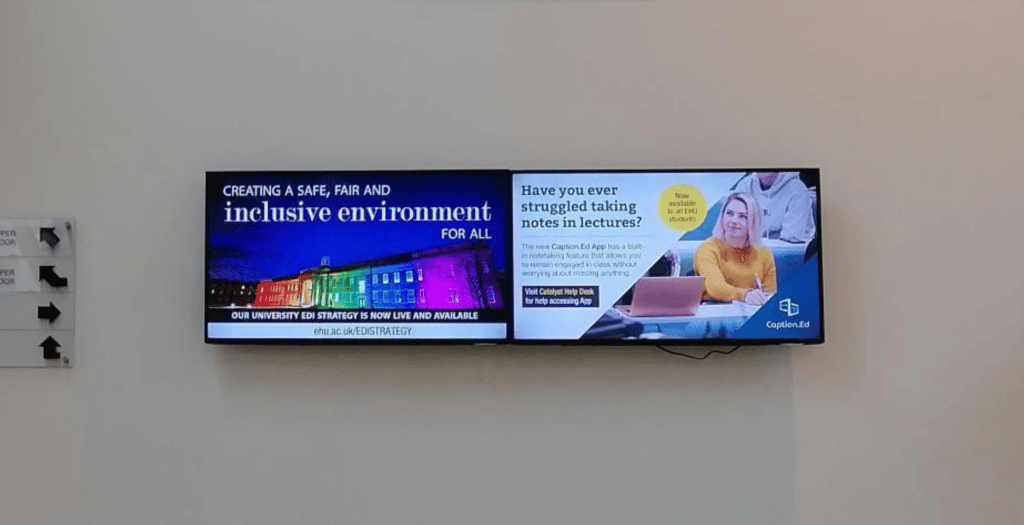What is Equality, Diversity, and Inclusion, aka EDI? It’s a catch-all term that ensures fairness and protection for all. None of us should expect to feel excluded, harassed or discriminated against. But in reality, many people are subject to prejudice, limited opportunity, victimisation, and unconscious cultural bias.
To address this in the context of Higher Education, EDI policies exist to protect students and staff and promote inclusivity. Some examples include making reasonable adjustments for students with disabilities, improving progression for BAME staff and students, encouraging women to study STEM subjects, and closing the degree awarding gap.
In this article, we’ll explain more about what is Equality, Diversity and Inclusion. Then we’ll uncover some of the positive actions we’ve seen to promote EDI across UK Universities and HE institutions.
What is Equality, Diversity and Inclusion (EDI)?
Equality, Diversity and Inclusion is a phrase used to ensure everyone within an organisation or community receives fair and equal treatment. EDI policies exist to protect staff, users, customers, and clients but also to promote the widespread benefits of diversity.
The Equality Act 2010 provides legal protection from such risks and sets out a list of protected characteristics to highlight who is most vulnerable. If individuals recognise they’ve received unfair treatment, or have particular needs in these areas, they have a legal right to take “positive legal action” against the perpetrators.
What are the protected characteristics?
So which characteristics does The Equality Act 2010 protect?
- Age
- Disability, which includes neurodivergence
- Race
- Sex
- Gender reassignment
- Being married or in a civil partnership
- Religious belief
- Sexual orientation
- Being pregnant
To help you understand more about this, we’ve broken down each phrase section.
What is Equality?
Equality is defined as treating everyone as an individual. But it’s also about giving individuals an equal opportunity to make the most out of their talents and abilities.
What is Diversity?
Everyone benefits when different people from different backgrounds make up groups or communities. As one example, the number of pupils getting a place at University who receive Free School Meals (FSM) increased last year. Figures show the gap between FSM and non-FSM pupils decreased to 18.7 percentage points. Not only is this fairer for everyone but it illustrates the UK’s commitment to widening participation and increasing diversity in HE systems.
What is Inclusion?
Inclusion lets individuals within a group or community be seen, heard, and valued. In University settings specifically, inclusion means creating equal opportunities for faculty members and support staff, but also giving students fair access to education and training.
What is Equality, Diversity and Inclusion at University?
Universities across the UK promote and support EDI in a variety of exciting ways.
Autism mentoring at The University of Edinburgh
The Equality Act defines disability as a physical or mental impairment that has long-term adverse effects on a person’s ability to handle normal day-to-day activities. And it covers impairments that may be invisible to others, such as heart disease, diabetes, dyslexia and some mental illnesses.
As a client of Caption.Ed, the University of Edinburgh is well-versed in addressing the needs of their students with Specific Learning Difficulties (SpLD). In addition to lecture captioning, they offer a range of one-to-one tutoring and mentoring support. Through session work, students with SpLD receive bespoke support from tutors. Plus, students with autism get access to mentoring support for all aspects of Uni life. These can include things like managing stress to developing independent study techniques.

Kingston University’s Equality Network
Kingston University runs a bespoke Equality Network. It’s an open forum to enable community-led efforts in driving EDI, where many students and staff come up with ideas and work harder to make a difference to their community.
Shortlisted for The Times Higher Education awards, Kingston University developed a 5-year plan to give staff and students a voice while driving diversity disclosure rates to 90%. This is also particularly important for neurodivergent students who may be hesitant to be open about their disability.
“It’s been brilliant to see so many students and staff coming up with ideas and working together to make a difference for the entire University community. We’re proud of everyone who has taken part in making this a successful initiative and to see their efforts recognised in the Times Higher Education awards.”
Jenni Woods MBE – Head of Access, Participation and Inclusion, Kingston University
VC’s Diversity Awards at the University of Oxford
In January 2015, Oxford University created the post of University Advocate for Equality & Diversity. In alliance with the Vice-Chancellor and through high-profile events, the University Advocate for Equality and Diversity strives to celebrate under-represented groups.
A good example includes the Vice-Chancellors Diversity Awards which recognises inspiring individuals who’ve demonstrated leadership and made a difference to EDI at Oxford.
Edge Hill students gaining a learning edge
In their attempts to promote an inclusive environment for all students, Edge Hill University trialled Caption.Ed with a number of student volunteers.
All volunteer students found Caption.Ed helped them in different ways. This included adapting to their need for notetaking, providing accurate captioning, and offering complete transcriptions. All students said it was very helpful to have a versatile captioning and note-taking tool that supported their needs across a range of preferred platforms.

Widening access for neurodiverse students (ENTENDER)
ENTENDER or “UNDERSTAND” aims to improve access, retention, graduation and employment prospects for people with neurodiverse conditions in Argentina and Mexico. It’s run as a collaboration between Coventry University and several global HE institutions.
Recognising how people with neurodiverse conditions can become marginalised, the project aims to create a set of processes to screen for neurodiversity without reliance on disclosure. These tools reveal the true needs of neurodiverse students and students with Specific Learning Differences.
Caption.Ed is one of the best tools to widen inclusion for neurodiverse and SpLD students
When they’re armed with more knowledge of what Equality, Diversity and Inclusion is, staff and students work together better to improve outcomes for students and break down barriers.
But one way staff and faculty can give more support to students with neurodivergent conditions is through the use of Caption.Ed. With its ability to adapt to a variety of neurodiverse conditions, to improve focus and concentration, and boost comprehension, Caption.Ed’s seamless captioning will make a marked difference to any EDI efforts.
To find out more and receive a free trial for your university, contact the sales team here at Caption.Ed today.


